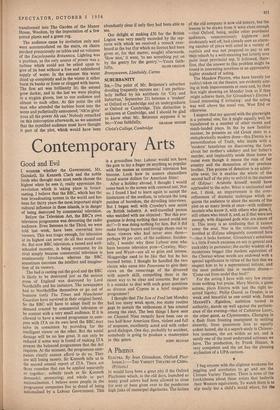Contemporary Arts
Good and Evil
I WONDER whether the Government, Mr. Gaitskell, Sir Kenneth Clark and the noble lords who thought man must needs choose the highest when he sees it, really appreciate the revolution which is taking place in broad- casting. I believe that the BBC, which has the best broadcasting system in the world and has been for thirty years the most important single cultural influence in these islands, is in danger of being destroyed by commercial television.
Before the Television Act, the BBC's own television programme was devouring the radio audience. Even listeners to the Third, we were told last week, have been converted into viewers. This was tragic enough, for television at its highest can never do all that sound can do. But now BBC television, a tamed and well- schooled monster, is being overcome by its rival simply because commercial television is continuously frivolous whereas the BBC sometimes exercises the intellect and imagina- tion of its viewers.
The bad is casting out the good and the BBC is likely to be destroyed just as the serious press of England was destroyed by Lord Northcliffe and his imitators. The newspapers had to Northcliffise themselves or go out of business (only The Times and Manchester Guardian have survived in their original form). So the BBC will have to adapt itself to the demand created by commercial television or be content with a very small audience. If it is allowed to have a second programme to com- pete with ITA on its own level the BBC may salve its conscience by providing for the intelligent viewer on the other. But the social damage will be no less great. It can only be reduced if some way is found of making ITA present the balanced programmes that the Act requires. At the moment, the programme com- panies clearly cannot afford to do so. They are still losing money, Sir Kenneth tells us in the second annual report of ITA. There are three remedies that can be applied separately or together: subsidy (such as Sir Kenneth demands); sponsoring; and whole or part nationalisation. I belieye some people in the programme companies live in dread of being nationalised by a Labour Government. This
is a groundless fear. Labour would not have the guts to lay a finger on anything so popular with the masses as commercial television has become. Look how its austere chancellors found scarce dollars for American films!
After a holiday abroad, I thought I would come back to the screen with renewed zest: Not so. I found I had to learn again to accept the limitations of the medium, to tolerate the long patches of boredom, the drivelling interviews. But I began well with Crawley's new series on British industry. A well-travelled person who watched with me objected: 'But this pro- gramme is doing nothing that sound could not do!'—It was doing nothing for him. But it did make foreign buyers and foreign shops real to those viewers who had never seen them— perhaps 90 per cent. of the audience. Inciden- tally, I wonder why these Labour men who have become television pros—Crawley, May- hew and Wyatt—are all so grim and intense. Muggeridge used to be like that but he has learned better. I thought he handled the two clerics who came into Panorama to give their views on the remarriage of the divorced with superb skill, compelling them in the nicest way to be clear and concrete. But isn't it a mistake to deal with such great questions as divorce and Cyprus in a brief magazine programme?
I thought that The Son of Fred last Monday had too many weak spots, too many routine gags to sustain the enthusiasm it has created among the elect. The best things I have seen on Channel Nine recently have been one or two half-hour American films, violent and full of suspense, excellently acted and with rather good dialogue. One day, probably by accident, somebody is going to produce a masterpiece in this genre. JOHN BEAVAN


















































 Previous page
Previous page